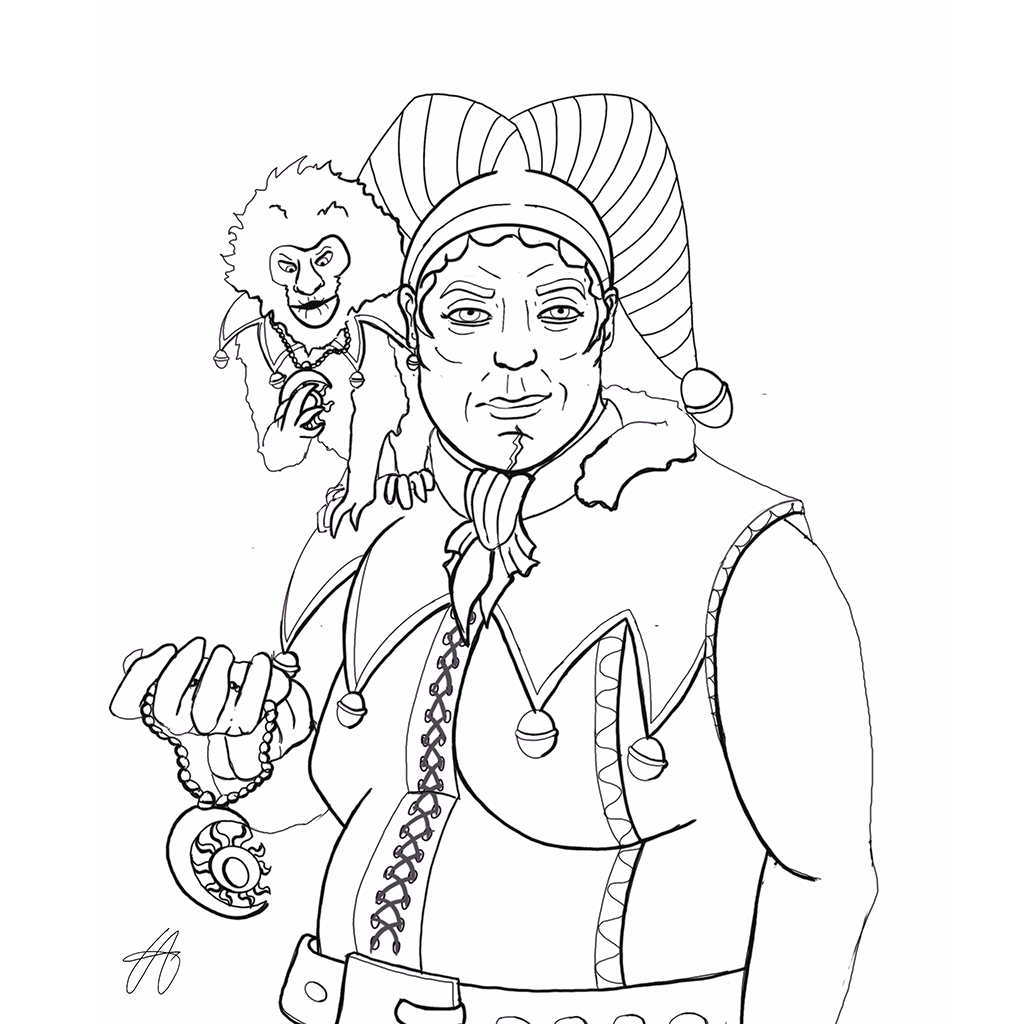Feydor Foolson

The King of Anglonia’s court jester is a 40-year-old eunuch with a bad attitude. He has been bred and schooled his whole life for his role in the top court of the land by Imelda, his foul, scheming witch mother, and in order to survive her attentions, he has had to become equally scheming and twice as smart. It’s often written that, historically, the jester wasn’t only at court to entertain. He was there as the only person who could gainsay a powerful noble, and be given the license to offend even a monarch. I don’t know the truth of that, but it works for my story. Apparently, it could be a fine line between amusing and gravely offending and occasionally Feydor steps over it. In the story, the Lord High Priest is out to get him, seeing him as a rival for the King’s favour. He tries to recruit Feydor to his own cause and when that fails, resolves to do away with him. Except that Feydor can see him coming and take steps to fool and belittle him. Jesters tended to come in two broad types. Many, if not most, were natural fools (this is the term used during the Tudor period), which is to say they were, as they say, differently enabled, usually either being born with some kind of reasoning or psycho-emotional limitation (I’m skirting round the language here to try not to offend), or being rendered so by an accident or violent act. They were sometimes employed as acts of charity, for instance, when a wealthy noble wanted to show off their benevolence toward some disadvantaged creature, and, rather like a young child, their outbursts or general bad behaviour would have been tolerated. Then there were the clever ones, the equivalent of modern fast witted standup comics or entertainers, men (and women) who rose well above their birth status by dint of their talent. I find these individuals fascinating. Henry VIII, for example, had a jester called Will Sommers for several decades. While undoubtedly disadvantaged, Sommers had a shrewd wit and Thomas Cromwell acknowledged how the man sometimes drew the King’s attention to egregious acts of excess or hubris in a way nobody else could. As a eunuch, Feydor is corpulent, soft featured, largely lacking in both facial and body hair and has a peculiar high-pitched voice that he uses to entertain and enchant. He nurtures an extensive network of informers and agents throughout the city of Ludnam, which he pays for by stealing and fencing items of value from noble and royal residences. He is as comfortable dealing with the underbelly of the city as he is with the top echelons. He is surprisingly popular with the ladies at court, for reasons we discover in the story. I partly drew inspiration for Feydor from the character of Varys in Game of Thrones. As was common for medieval jesters, he has a pet monkey called Filthy (an exotic creature for the times) and right from the outset, the two hate each other. I came across some sources that talked about eunuchs being used for sexual favours by both men and women. The Kama Sutra, for example (or at least a version of it I read) described how eunuchs were often barbers who would, in addition to taking care of a gentleman’s appearance, would also perform a certain sexual act on them. While interesting, I couldn’t see a way to use this in a medieval context. But then I read much more recent accounts relating to young boys who’d been castrated as a way to preserve their boyhood singing voices. It transpires that when they grew up and performed in theatres, fine ladies were attracted to them and then used them “for pleasure.” Some of them apparently became quite wealthy, and this much I did use in my story. Feydor has to fight battles on two broad fronts. On the one hand, life in the court of King Inglebert is always precarious, and he has to constantly be on the alert for backstabbers, including his royal patron. On the other hand, he hates and resents the way his ghastly dark witch of a mother seeks to control him. He spends a lot of time and energy plotting how to be rid of her.